|
The forty
years of the Savannah Jazz Band
The band formed Spring, 1979, date unknown. Original members were Terry Mellor (bass), Bob Blake (banjo), Unknown (drums), Peter Gledhill (trombone), Tony Smith (trumpet), and Paul Harrison (clarinet). They started in a pub in Slaithwaite, near Huddersfield. The pub collapsed early 1980, and band members met at the Station Tavern, Huddersfield to discuss where they might play. Landlord Wilbert John Cock showed some interest and gave them a month. The residency lasted 25 years and ended in May, 2005. Wilbert invited Humphrey Lyttelton to play on the first anniversary in 1981, and he was the first of many other well known jazz musicians during the 25 years invited to play with the band. These included Cy Laurie, Alan Elsdon, Sammy Rimington, Pat Halcox, Monty Sunshine, John Crocker, Fred Hunt, Roy Williams, Digby Fairweather, Keith Nichols, John Barnes, Phil Mason, Colin Bowden, Vic Pitt, Jim McIntosh, Pete Allen, Tommy Burton, Adrian Cox, Ian Wheeler, Ron McKay, Sonny Morris, and Campbell Burnap - a veritable who's who of the jazz world. It was a wide-ranging and very successful period.
Mick Shore left in November, 1987 and Brian Ellis joined in February, 1988. Things started to change quickly after that. The band was still operating as a local one, but that soon changed. In 1988, they were invited to play at their first jazz festival at Buxton and unbeknown to them they were recorded by Stan Bowman. This cassette (the then modern recording medium) took off and people from all over the country and Europe started to take an interest. 1989 brought invitations to various festivals from George Webb, Richard Waterhouse and Phil Mason; also the first visit of many trips to the 100 Club, Oxford Street combined with the Barbican, and purely coincidentally, the Rugby League Final at Wembley! During this year, arrangements were made to record the first CD with Lake Records - unimaginatively titled - 'The Savannah Jazz Band'. 1990 brought invites to festivals at Keswick, Bude, Upton, Edinburgh and Hexham. The band has now appeared at Keswick every year since - 29 times - and was there this year too. The tours of European countries started in the 1990s including Germany, Holland and Denmark, followed by Norway and Belgium. The band was invited to Canada twice and also holiday destinations in the Mediterranean, notably Majorca. Four more CDs were recorded by Lake Records with consistent band personnel; this unfortunately was not to last. 1996 brought illness to the band. Martin Fox was diagnosed with inoperable cancer in November. At the same time Brian Ellis was diagnosed with bowel cancer, but fortunately he was sidelined for only eight months after a successful operation. During this time he continued with the band as a pianist where possible and Dave Morrell took over the trombone position. Martin also continued playing until September, 2000; he died in March, 2001 aged 60 and was greatly missed. Gabe Essien took over in 2002 for a while, then Rod Chambers in 2005. Roger Myerscough joined in 2011 after the demise of the Phil Mason Band. In 1999 Tony Smith became seriously ill and left the band, aged 65. He was replaced by Geoff Wilde for a few years after which Bill Smith joined the band in 2003. Jack Cooper retired from playing in 2005, replaced by Louis Lince until 2012, after which Chris Marney joined on banjo. Visits to Warner Hotels were also regular throughout these 20 years, thanks to Pete Lay and Denise and Tony Lawrence. The band now entertains at SAGA weekends, a fitting destination after 40 years of playing.
In 1999 Stan Ward, a resident
of Huddersfield, introduced himself to the band at the Station Tavern after
seeing them at a Warner's Weekend at Nidd Hall. Stan and his wife Janet had gone
to the hotel not specifically for the jazz, but just a weekend break and were
unaware of the band regularly playing so close to home until informed by a
couple sharing a dinner table with them.
Finally, the band would like to thank all the promoters, club band bookers and all the fans that have supported them for all those years and raise a glass to absent friends. The band members are all mates together; they listen and generally behave in a pleasant manner towards each other and they still enjoy what they do. The music has always been important and fabulous to them. They still believe they have more to learn and hope they can still improve. The relationship they have with all the fans has always been, and will always be, paramount. What a splendid journey they have travelled, to have the opportunity to play such marvellous music, and consider themselves very lucky people. They hope to continue the journey for many years to come. Peter Maher * * * * * * Brian 'Sam' Ellis It was December, 1987, when I was invited to play with the band on the Thursday between Christmas and New Year. It must have been a memorable occasion, because shortly after that I was invited to join on a permanent basis. I gave it a few seconds thought and decided it was more the type of music I wanted to play. In February, 1988, I joined. I have always been the 'mouldy fygge' of the band and with Tony smith, Martin Fox, Jack Cooper, Steve Carter and John Meehan, I knew it would be a good move. I was thrown into the deep end and given the job of being responsible for the choice of tunes, etc. It was a job I had never had to do before, so had to think which direction we should go. With the help of Jack Cooper, who had similar tastes to me, we headed for the early Colyer/Barber/Lewis sound without copying anyone, but to try and develop our own, which I think we did. We became quite successful in our attempt and on our way met lots of wonderful musicians and people we can all good friends. We have travelled all over the world to festivals, jazz clubs, etc; we also have 27 (Ds to our name. Over the years, we have had the pleasure of playing with top musicians both as guests and as members of the band. Our signing off tune has always been Goin' Home and we have played it after every gig, except on one occasion for some unknown reason. I got the biggest rousting from a supporter for changing things. Anyway, after 31 years of being with the band and still responsible for the music, I was presented with a beautiful cut glass brandy glass and a bottle of brandy to show appreciation. Thankfully, I have an understanding wife and family, and apart from all the travelling, it has all been worth it. Long may it continue. Brian * * * * * Roger Myerscough As the second most recent recruit to the Savannah ranks, I must say that John Meehan's invitation to join was heart-warming - or was it?! Before accepting I warned my undertaker to be prepared - my three predecessors in the reed section had all left the world behind too soon - could I be the one to break the spell? Eight very happy years later it would appear I have. Although born and bred in the City of Liverpool, I moved to my adopted home of Yorkshire when I left the Merchant Navy and had wonderful years with the Yorkshire All Stars and Yorkshire Post Jazz Band and then kept the travel agents busy whilst with the Phil Mason band for twelve years. I had moved to Essex in the final years of the Mason band, which was based, personnel-wise, in the London area. Maybe having said yes to John I should have considered moving back North, but in reality, the Savannahs are just as popular down here in the tropics as everywhere else on the globe, and it means I have even better chances to achieve my goal of getting as far as 'Book Two'!! In all seriousness, I salute all my lovely band mates and thank them for having me along for the ride and the music. Long may it continue. Roger * * * * Tony Pollitt
A recently overheard
conversation at a jazz festival: "You enjoying the weekend?" "Yes, there's lots
of good bands, but I’m really looking forward to the next one." "Why, who are
they?" "The Savannah; I’ve been following them for over 25 years. It's their
40th Anniversary this year." "Fortieth, 40 years, they must have started playing
when they were 'bloody' young!" It has to be noted that the last remark was made
by a gentleman wearing dark glasses, carrying a white stick and accompanied by a
large friendly dog. Yes, it's our 40th Anniversary year, but where has all the time gone and what does it represent? Well, how about 5,000 gigs, about 1 3,000 hours of performing a repertoire of over 1,500 tunes, around 40,000 hours of travelling to and back from gigs, to say nothing of over 600,000 miles of motorways! It's also resulted in lots of laughs, many happy but also sad times. That just about sums up the glamour - GLAMOUR, yes glamour of playing in a jazz band. How did it all start? The band was formed in April, 1979 by Terry Mellor (bas) and consisted of Tony Smith (trumpet), Bob Blake (banjo), Paul Harrison (clarinet), Pete Gledhill (trombone) and a drummer. However, no one can recall his name, but he didn't last very long because, by October of that year, John Meehan occupied the drum stool. The band first played weekly at the Pack Horse pub in Slaithwaite (Yorkshire), but moved after a year to the Station Tavern in Huddersfield, where it enjoyed a 25-year residency every Thursday evening. In the early years, it experienced numerous personnel changes, the first being Paul Harrison who was replaced by Frank Whitham, then Gordon Stafford, Nick Groves and Martin Fox in 1983. In 1982, Pete Gledhill left. Pete Haslam (a Lancashire lad) helped out, until Mick Shore joined for the next five years. The banjo chair was the next instrument to suffer a change. Bob Blake had a nasty accident at work and was replaced by Jack Cooper. In 1985, the tragic death of Terry Mellor, the founding bass player, resulted in Tony Pollitt joining; the first gig (a commemorative evening for Terry) featured a front-line of John Barnes, Pat Halcox and Roy Williams - WOW what an evening! However, Tony only lasted six months as business opportunities resulted in his relocation to London and Steve Carter took over. The band personnel problems now appeared to be over and, with a settled line-up, it prospered and, over the next five years, was invited to perform at more and more distant venues. Guest stars also featured from time to time and since Humphrey Lyttelton first appeared back in 1981, a variety of well-known musicians have played with the band, including John Barnes, Pat Halcox, Roy Williams, Sammy Rimington, Campbell Burnap, Monty Sunshine, Alan Elsdon, John (rocker, Ian Wheeler, Colin Bowden and Tommy Burton, to mention just a few. Prior to many of these guests though, the band's initial high spots had been, supporting the 'Peanuts' Hucko band and Bob Wilber with the 'Bechet Legacy' concerts in 1981 and 1982 at the now defunct 'Jazz at the Shay' Huddersfield venue.
In compiling these notes, I’m
reminded of one incident from the early days that befell Terry Mellor and a
certain female vocalist whose voice was matched by her chest dimensions. Terry
used to use talcum powder to protect his fingers whilst playing the bass and on
this occasion took the singer into the band room to discuss the evening's
programme. She subsequently emerged, red-faced and displaying talcum powder hand
prints on her embon points (bosom to you). No names, no pack drill as the saying
goes.
However, to continue with the band history. Its success, whilst welcomed, eventually resulted in personnel problems once again. In 1987, Brian Ellis was persuaded to join the band as a replacement for Mick Shore and a year later Steve Carter left due to conflicts between family and banding needs. Tony Pollitt rejoined in 1988, having by this time, returned from London. The band's gig programme had become akin to a travelogue - London (100 Club) one weekend, Scotland the next, south coast the following weekend. As the band was usually accompanied by a coach load of supporters, the club promoters were very pleased to see us and the extra paying punters that arrived at their venues. Upton, Keswick, Bude, Isle of Bute, Edinburgh, each weekend was like a continuous family party. It was at this stage that Continental Jazz festivals were embraced with annual visits to the many locations in Holland, Germany, Denmark and Belgium. These usually necessitated an overnight ferry journey which brought its own problem. One member of the band introduced the concept of; "I feel a net loss coming on," which was hardly surprising, since he spent the entire overnight journey in the bar in the company of non-English speaking truck drivers. By morning, entente cordiale was achieved, life-long friendships cemented, all being achieved without understanding each other’s spoken tongues. But the phrase of 'net loss' persisted throughout the tour and that member was referred to as "a euphemism for a little song bird!" (Ask any member of the band at the bar for an explanation.) On leaving the ferry on the outward journeys, the visits were memorable for the intensity of the 'Thunder and Lightning' storms, which we attributed to the Dutch Musicians' Union's response to all the English bands who were taking their gigs.
The band then experienced the
second dark period. Martin Fox and Brian Ellis were diagnosed with cancer, both
within a week of each other. A crisis for their families, their friends and
fellow band members. It was decided that we should 'soldier on' and to use deps
as appropriate. This development coincided with an invitation from a
Huddersfield-based company to play at a Toronto Trade Fair. They had just
acquired a Canadian offshoot and their senior management were regular Station
Tavern pundits. A dep trombonist was 'roped in’, Dave Morrel (another bloody
'Tyke' - it was rumoured he had never travelled far from Huddersfield). He was
asked to bring his passport as the next gig was on the west side of Manchester
(Lancashire territory). Toronto is west of Manchester isn't it?
On the trip, to minimise hotel costs, band members shared bedrooms. After a night's playing and the occasional drink we retired to our beds. In the dead of night, 'nature' calls; it is common practise at such times to forgo using the bedroom light, so as not to wake up the second occupant. In the dark, you feel your way around the room until you find the bathroom and then the ‘john’. Unfortunately, one member of the band is known for his propensity for falling asleep on the loo. Therefore, imagine the scenario of the second person experiencing a similar ‘call of nature' who then follows the established night time protocol. Yes, in the dark, he sat on my lap! Brian Ellis responded to treatment and made a full recovery, whilst Martin unfortunately didn't; he eventually passed away in 2001. Prior to this, Tony Smith, one of the founding members, also suffered a period of illness and subsequently left the band in 1999 for pastures new; his replacement for a few years was Geoff Wilde and in 2003 William (Bill) Outram Smith (no relation to Tony), joined. Whilst we're on the serious side, Johnny Rodgers helped out until Gabe Essien took over the clarinet chair for several years, then Rod Chambers; however, both succumbed to the Grim Reaper. Our current incumbent is Roger Myerscough of the late Phil Mason's New Orleans All Stars. The banjo chair has also seen changes; long serving Jack Cooper of 'song thrush fame' left through ill health to be replaced by Louis Lince and then to our current recruit, Chris Marney, who officially joined in 2015, after sharing duties with the Gambit Jazzmen since 2012. Throughout all the personnel changes, the band's gigs had changed from being local Yorkshire venues to, first, north of England, then expanding to cover the UK and ultimately, going International. The overwhelming influence has , been the need to entertain, not educate our audiences; people go to jazz clubs and festivals to enjoy themselves - not to be lectured to!
In a continuation of that
theme, let's return to the Station Tavern period and, in particular, to the
publican, mine host J. Wilbert Cock. Here was a man whose business card showed a
certain eccentricity of mind; to whit. . ."Expert 0arsman, Marriage Guidance
Councillor, Champion of the Unfortunate, World Traveller, Hero, Seeker of Peace,
Poet, Philosopher, Diplomat, Prophet, Legend, Soldier of Fortune and Singe/'- a
rare set of skills for a publican. It was the last two that used t0 trouble the
band. At some point during the weekly Thursday evening's proceedings he would
insist his followers demanded he perform. His repertoire consisted of Wo Going back full circle to those earlier days, the band remembers its first major gig at a London ballroom, playing in front of an unfamiliar audience (Southerners!). We commenced our first set with a stomper and the dance floor soon became crowded. This continued through the second number and then into the third tune. Suddenly half way through that number, the dancers stopped dancing and started applauding. We refer to it as our 'Glenn Miller Orchestra’ moment. (Those of you who have seen the film will know what we mean.) This behaviour was strange to us, as when Tony Smith commenced the vocal part of the number, the applauding dancers formed into lines and started advancing towards the bandstand whilst waving their arms up and down in unison and chanting what sounded like "hissing down, hissing down." We had never experienced this kind of response, but I'm certain that by now the discerning reader will have guessed the title of the number. Yes, it was I Get The Blues When It Rains. There's nowt so strange as folk. So it's our 40th Anniversary, but somewhere it is someone else's 30th, or 20th, or even 1st Anniversary, and here I refer to you, the punters, who turn up at jazz clubs and festivals. Without you, there would be no us, and therefore no 40th year celebrations. In answer to that first comment, "They must have started bloody young," yes, we all did, but not necessarily on the same instrument or in the same band. Several of our members have been fortunate to receive OBE awards; however, in this context, it refers to being 'Over Bloody Eighty’. Playing this music keeps us all mentally, if not physically, eternally young. It has been a marvellous journey and we are now looking forward to the next decade. As long as promoters promote, and punters keep attending the venues, we will try to keep entertaining you all. Thank you for your support, both in the past and hopefully, in the future. Tony |
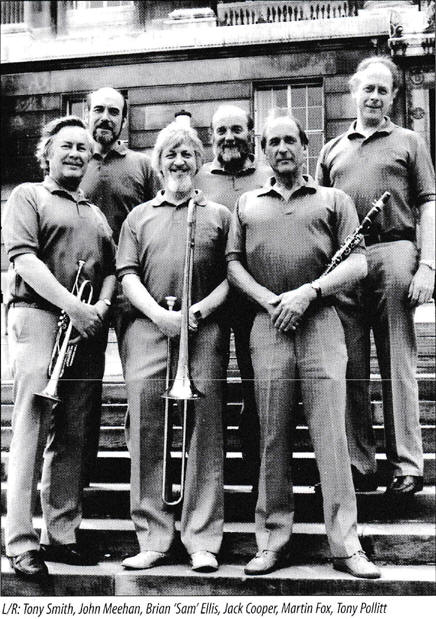 During the first five years
there were changes due to emigration and injury, which led to the line-up
becoming John Meehan (drums), Jack Cooper (banjo), Terry Mellor (bass), Mick
Shore (trombone), Martin Fox (clarinet) and Tony Smith (trumpet). Terry Mellor
died suddenly in September, 1985, and after a meeting of the rest of the band
John Meehan became the 'leader’ with some reluctance, due to his inexperience in
the jazz world. After Terry died, Tony Pollitt joined, but had to leave shortly
afterwards because of work commitments in London and Steve Carter joined until
1989 when Tony returned and re-joined the band.
During the first five years
there were changes due to emigration and injury, which led to the line-up
becoming John Meehan (drums), Jack Cooper (banjo), Terry Mellor (bass), Mick
Shore (trombone), Martin Fox (clarinet) and Tony Smith (trumpet). Terry Mellor
died suddenly in September, 1985, and after a meeting of the rest of the band
John Meehan became the 'leader’ with some reluctance, due to his inexperience in
the jazz world. After Terry died, Tony Pollitt joined, but had to leave shortly
afterwards because of work commitments in London and Steve Carter joined until
1989 when Tony returned and re-joined the band. 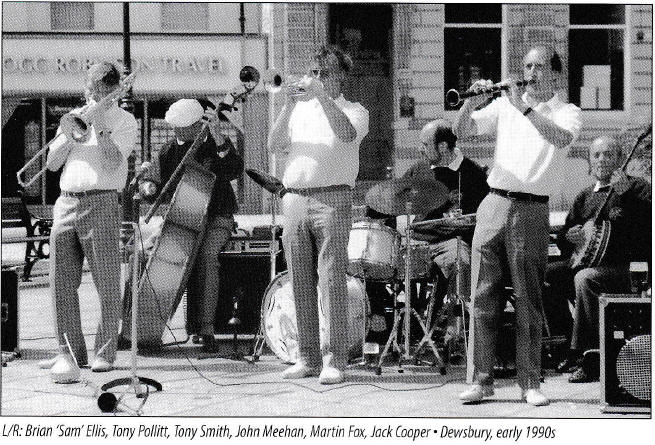 This introduction led to a great
friendship between Stan and the band members, particularly John. Also, Stan
introduced John to the digital age, using his computer for publicity and email
communication. He also made and produced a series of live recordings of the band
at local venues. The qualities of these were good enough to sell and this gave a
boost to the band's income and allowed a greater diversity of travel around the
country. Stan, along with Peter Maher from Essex, gave the band an online
presence with a website, which continues to this day. Unfortunately, Stan died
in 2016 after a protracted illness. He had a great effect on the band's progress
during his involvement.
This introduction led to a great
friendship between Stan and the band members, particularly John. Also, Stan
introduced John to the digital age, using his computer for publicity and email
communication. He also made and produced a series of live recordings of the band
at local venues. The qualities of these were good enough to sell and this gave a
boost to the band's income and allowed a greater diversity of travel around the
country. Stan, along with Peter Maher from Essex, gave the band an online
presence with a website, which continues to this day. Unfortunately, Stan died
in 2016 after a protracted illness. He had a great effect on the band's progress
during his involvement. 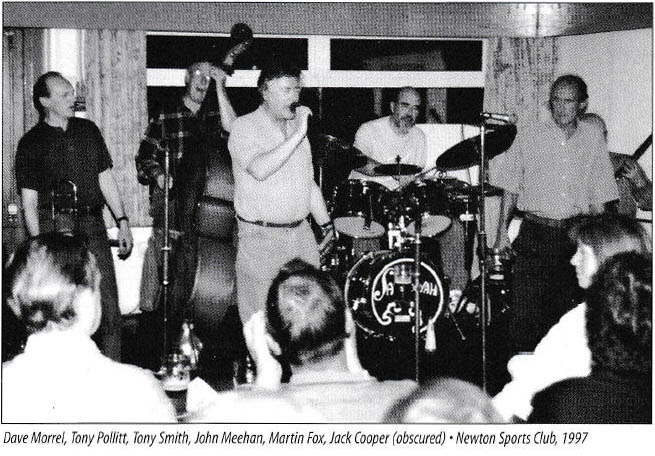
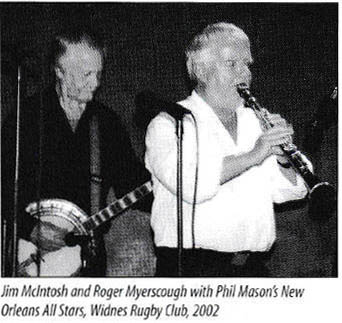
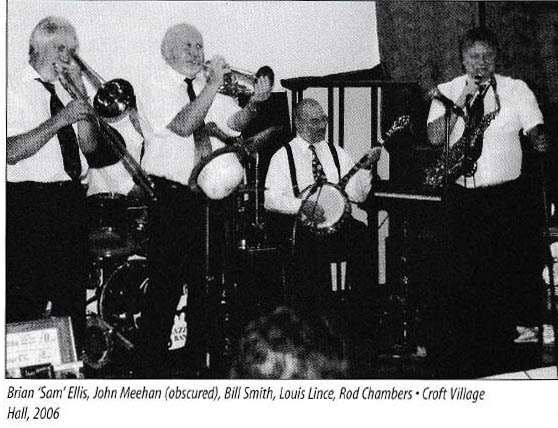
 rld War
One songs which he performed with gusto (Its A Long Way.., Nellie Dean...
Goodbye Dolly, etc), whilst Tony Smith relieved him of his braces; the medley
ending with Wilbert clutching his trousers and being pelted with raffle tickets
by the audience. Wilbert ever the showman!
rld War
One songs which he performed with gusto (Its A Long Way.., Nellie Dean...
Goodbye Dolly, etc), whilst Tony Smith relieved him of his braces; the medley
ending with Wilbert clutching his trousers and being pelted with raffle tickets
by the audience. Wilbert ever the showman!